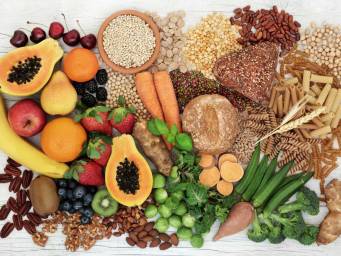First Published
 |
| Whole grain cereals and fruit are excellent sources of fiber. |
Researchers and public health organizations have long hailed the
benefits of eating fiber, but how much fiber should we consume, exactly? This question has prompted the World Health Organization (WHO) to commission a new study. The results appear in the journal The Lancet.
The new research aimed to help develop new guidelines for dietary
fiber consumption, as well as reveal which carbs protect the most
against noncommunicable diseases and can stave off weight gain.
Noncommunicable diseases
are also called chronic diseases. They typically last for a long time
and progress slowly. According to WHO, there are "four main types of
noncommunicable diseases:" cardiovascular diseases, cancer, chronic respiratory diseases, and diabetes. Professor Jim Mann, of the University of Otago, in New Zealand, is
the corresponding author of the study, and Andrew Reynolds, a
postdoctoral research fellow at Otago's Dunedin School of Medicine, is
the first author of the paper. Prof. Mann explains the
motivation for the study, saying, "Previous reviews and meta-analyses
have usually examined a single indicator of carbohydrate
quality and a limited number of diseases, so it has not been possible
to establish which foods to recommend for protecting against a range of
conditions." To find out, the researchers performed a meta-analysis of observational studies and clinical trials.
Daily intake of 25–29 grams of fiber is ideal
Reynolds and colleagues examined the data included in 185 observational studies — amounting to 135 million person-years — and 58 clinical trials which recruited over 4,600 people in total. The studies analyzed took place over almost 40 years.
The scientists investigated the incidence of certain chronic
diseases, as well as the rate of premature deaths resulting from them.
These conditions were: coronary heart disease, cardiovascular disease, stroke, type 2 diabetes, colon cancer, and a range of obesity-related cancers, such as breast cancer, endometrial cancer, esophageal cancer, and prostate cancer.
Overall, the research found that people who consume the most fiber in
their diet are 15–30 percent less likely to die prematurely from any
cause or a cardiovascular condition, compared with those who eat the
least fiber.
Consuming foods rich in fiber correlated with a 16–24 percent lower
incidence of coronary heart disease, stroke, type 2 diabetes, and colon
cancer.
Fiber-rich foods include whole grains, vegetables, fruit, and pulses, such as peas, beans, lentils, and chickpeas.
The analysis also revealed that the amount of fiber that
people should consume daily to gain these health benefits is 25–29 grams
(g). By comparison, adults in the United States consume 15 g of fiber daily, on average.
The authors also suggest that consuming more than 29 g of fiber per day may yield even more health benefits.
However, they do caution that, while the study in itself did not find
any adverse health effects of consuming fiber, eating too much of it
may be damaging for people with insufficient iron or minerals.
Eating large amounts of whole grains can further deplete the body of iron, explain the researchers.
Finally, the clinical trials included in the study also revealed that
consuming more fiber correlates strongly with lower weight and lower cholesterol levels.
Why fiber is so good for you
Prof. Mann comments on the significance of the findings, saying, "The
health benefits of fiber are supported by over 100 years of research
into its chemistry, physical properties, physiology, and effects on metabolism."
"Fiber-rich whole foods that require chewing and retain much of their
structure in the gut increase satiety and help weight control and can
favorably influence lipid and glucose levels," he adds.
"The breakdown of fiber in the large bowel by the resident bacteria
has additional wide-ranging effects including protection from colorectal cancer."
"Our findings provide convincing evidence for nutrition guidelines to focus on increasing dietary fiber and on replacing refined grains with whole grains. This reduces incidence risk and mortality from a broad range of important diseases."
Prof. Jim Mann

Comments